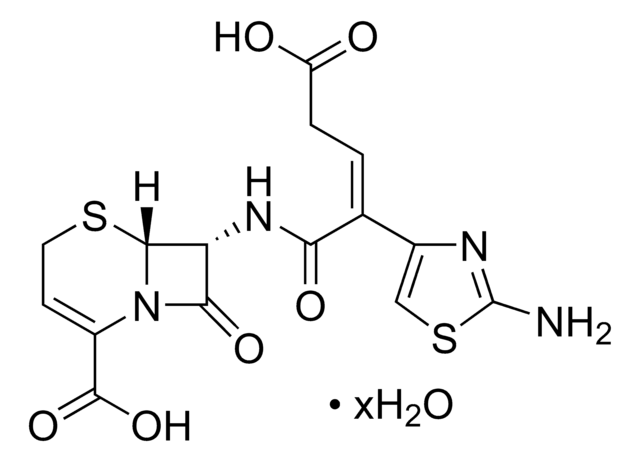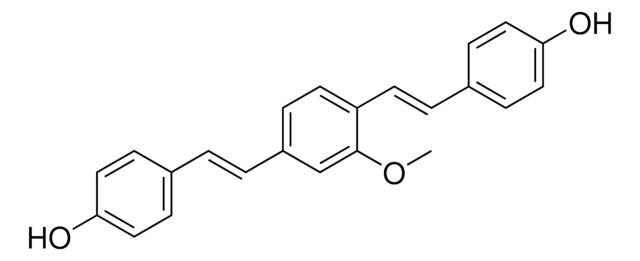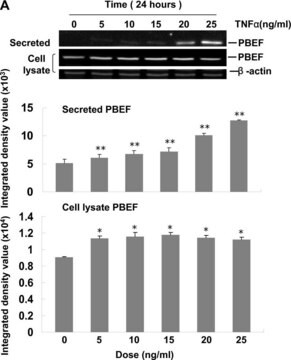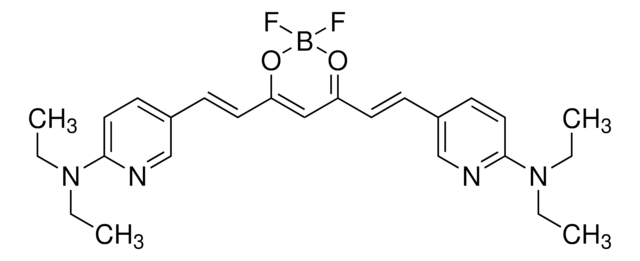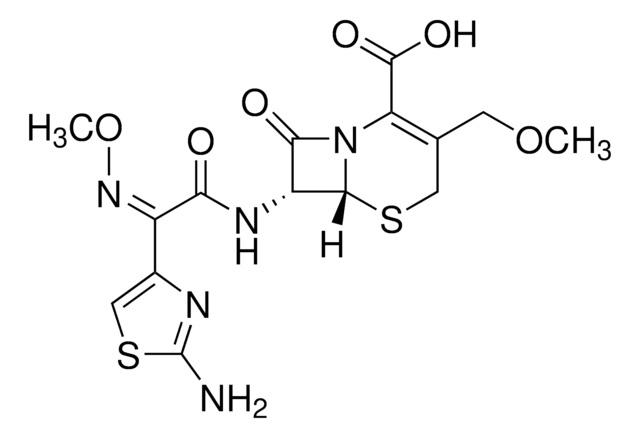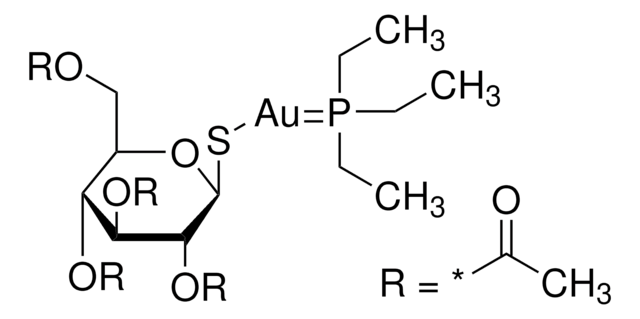SML1954
X-34
≥90% (HPLC), powder, amyloid-specific fluorescent dye
Sinónimos:
1,4-Bis(3-carboxy-4-hydroxyphenylethenyl)benzene
Iniciar sesiónpara Ver la Fijación de precios por contrato y de la organización
About This Item
Fórmula empírica (notación de Hill):
C24H18O6
Número de CAS:
Peso molecular:
402.40
MDL number:
UNSPSC Code:
12352200
NACRES:
NA.77
Productos recomendados
product name
X-34, ≥90% (HPLC)
Quality Level
assay
≥90% (HPLC)
form
powder
color
white to beige
solubility
DMSO: 2.0 mg/mL, clear
storage temp.
2-8°C
SMILES string
OC(C=C1)=C(C(O)=O)C=C1C=CC2=CC=C(C=CC3=CC=C(O)C(C(O)=O)=C3)C=C2
Biochem/physiol Actions
Fluorescent, amyloid-specific dye
X-34 (1,4-bis(3-carboxy-4-hydroxyphenylethenyl)-benzene) is one among the small-molecule γ-secretase modulators (GSMs) involved in lowering Aβ42 levels (the 42-residue isoform of the amyloid-β peptide). X-34 has also been used to visualize intracellular immunoreactive deposits with classic amyloid fibrillar ultrastructure in living transgenic Caenorhabditis elegans animals. It is also used as a histochemical stain for determining pathological changes in Alzheimer′s disease (AD).
X-34 is a fluorescent, amyloid-specific dye. It binds at a different site than Pittsburgh Compound B and is a highly fluorescent marker for beta-sheet structures.
Storage Class
11 - Combustible Solids
wgk_germany
WGK 3
flash_point_f
Not applicable
flash_point_c
Not applicable
Certificados de análisis (COA)
Busque Certificados de análisis (COA) introduciendo el número de lote del producto. Los números de lote se encuentran en la etiqueta del producto después de las palabras «Lot» o «Batch»
¿Ya tiene este producto?
Encuentre la documentación para los productos que ha comprado recientemente en la Biblioteca de documentos.
S D Styren et al.
The journal of histochemistry and cytochemistry : official journal of the Histochemistry Society, 48(9), 1223-1232 (2000-08-19)
X-34, a lipophilic, highly fluorescent derivative of Congo red, was examined as a histochemical stain for pathological changes in Alzheimer's disease (AD). X-34 intensely stained neuritic and diffuse plaques, neurofibrillary tangles (NFTs), neuropil threads, and cerebrovascular amyloid. Comparison to standard
Visualization of fibrillar amyloid deposits in living, transgenic Caenorhabditis elegans animals using the sensitive amyloid dye, X-34
Link CD
Neurobiology of Aging, 22, 217-226 (2001)
Marcus Bäck et al.
Chemistry (Weinheim an der Bergstrasse, Germany), 22(51), 18335-18338 (2016-11-04)
Deposits comprised of amyloid-β (Aβ) are one of the pathological hallmarks of Alzheimer's disease (AD) and small hydrophobic ligands targeting these aggregated species are used clinically for the diagnosis of AD. Herein, we observed that anionic oligothiophenes efficiently displaced X-34
Substrate-targeting ?-secretase modulators
Kukar TL
Nature, 453, 925-929 (2008)
Heidi Olzscha et al.
Cell chemical biology, 24(1), 9-23 (2016-12-19)
Lysine acetylation is becoming increasingly recognized as a general biological principle in cellular homeostasis, and is subject to abnormal control in different human pathologies. Here, we describe a global effect on amyloid-like protein aggregation in human cells that results from
Nuestro equipo de científicos tiene experiencia en todas las áreas de investigación: Ciencias de la vida, Ciencia de los materiales, Síntesis química, Cromatografía, Analítica y muchas otras.
Póngase en contacto con el Servicio técnico